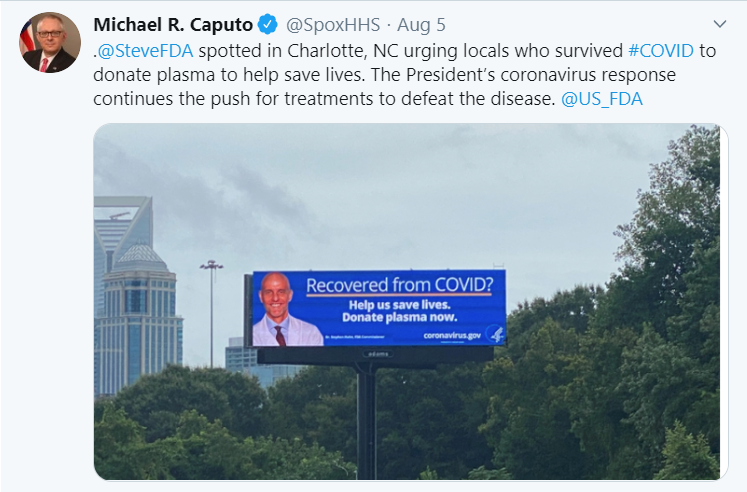Preapproval Promotion? US FDA Commissioner Touts ‘Lifesaving’ Investigational Plasma For COVID-19
Executive Summary
Hahn’s communications, which go far beyond the claims a sponsor could make of an investigational product, are raising new concerns about the agency’s ability to serve as a science-based regulator during the coronavirus pandemic. HHS Secretary Alex Azar and NIAID Director Anthony Fauci have also touted the lifesaving nature of plasma donations for COVID-19, even though the treatment is still unproven.
The US Food and Drug Administration’s public emphasis on the life-saving nature of plasma for COVID-19 is raising new concerns about the agency’s ability to serve as a neutral arbiter of safety and effectiveness during the coronavirus pandemic.
Commissioner Stephen Hahn is pictured on a billboard asking people who have recovered from COVID to “help us save lives,” by donating plasma. A picture of the billboard in Charlotte, North Carolina was tweeted on 5 August by Health and Human Services Assistant Secretary for Public Affairs Michael Caputo. It was retweeted the same day by Hahn.
It’s one of multiple examples of senior government officials, including Anthony Fauci, encouraging Americans to donate plasma for COVID-19 and insinuating it can help save lives.
“By donating your plasma you can literally help save lives,” HHS Secretary Alex Azar says in one public service announcement.
“You can literally help save lives,” Commissioner Hahn says in another public service video.
Fauci, the Director of the National Institutes of Infectious Diseases at NIH, repeats the same line in another PSA.
President Donald Trump has also been pushing for COVID-19 donations.
But convalescent plasma has not yet been proven to be safe and effective in clinical trials for treating COVID-19, nor does it have an emergency use authorization or approval from the FDA. Many of the products in the pipeline are still in preclinical or early phase studies. The National Institutes of Health COVID-19 Treatment Guideline Panel says there is insufficient data to recommend either for or against the use of the product.
Do As I Say, Not As I Do
Experts in pharmaceutical promotion say that if the billboard was being produced by a sponsor, manufacturer, packager or distributer, it would likely violate the Food, Drug, and Cosmetic Act, because it “seems to promise that donated plasma product will save a life,” said Dale Cooke, a regulatory consultant specializing in drug promotion. “I’m unaware of any completed studies or FDA approval of any product that would support such a claim.”
“If you want to make a claim that something regulated by FDA reduces mortality, not only do you have to run a study, but you have to run a really good study, because it is such an ambitious claim,” said Coleen Klasmeier, a partner at Sidley, who previously worked in FDA’s Office of Chief Counsel.
While the FDCA’s rules around company promotion wouldn’t apply to the FDA or HHS, Klasmeier said the Data Quality Act, also known as the Information Quality Act, which outlines standards that federal agencies must follow when they communicate publicly, would likely be applicable. The law was first passed as part of an appropriations bill in 1996 and is designed to ensure government communication is consistent with sound facts and science, she said. Both HHS and FDA have guidelines on how to comply with the law.
One drug company, Genta, used this law in 2007 to request FDA correct a statistical analysis it made in the review of its melanoma treatment Genasense (oblimersen) (Also see "Genta To File Complaint With FDA Over Statistical Analysis Of Genasense Data" - Pink Sheet, 30 Apr, 2007.).
McNeil Consumer Pharmaceuticals used the law in 2004 to complain about FDA's portrayal of acetaminophen in a campaign around safe use of over-the-counter pain mediicnes.
Klasmeier also said there is a provision in the FDCA that defines the circumstances in which FDA can engage in publicity. It says the agency can speak publicly in two instances: one is when there is a threat of immediate harm, and the other is when there is a threat of consumer protection. This allows the agency to speak up and warn consumers about potentially unsafe products or health fraud.
Klasmeier said she has challenged the agency using this provision when FDA has “spoken publicly about a product in a way that was pejorative and it didn’t meet those statutory standards or when they’ve been sort of freelancing, making these big giant announcements and they’ve exceeded the scope of that statutory provision.”
The plasma PSAs are inconsistent with other communication on FDA’s own website that points out that plasma has not yet shown to be safe and effective as a treatment for COVID-19, said Steven Woloshin, co-director of the Center for Medicine and Media at the Dartmouth Institute.
FDA did not respond to requests for comment by press time.
Communication Undermines FDA Credibility
Beyond the legal issues, experts worry that FDA’s role in this communication could undermine its ability to regulate plasma.
It may compromise FDA’s role as an impartial arbiter of whether a product is safe and effective, said Leigh Turner, a professor at University of Minnesota’s Center for Bioethics who researches the ethical, legal and regulatory issues associated with direct-to-consumer marketing of unproven and unlicensed cell-based interventions.
“The FDA has this important regulatory component. Part of that is being a kind of a national referee or a national umpire for new drugs and biologics and medical devices. …And so, I'm not sure that we should see the FDA engaging in this kind of PR activity,” Turner said.
“It raises these questions of is the regulatory bar being lowered, is there this push to get things into the marketplace. The FDA already prejudged in a way and kind of threw its weight behind [plasma],” Turner said. This could lead to reputational harm if studies eventually show that plasma doesn’t save lives.
“Why even go down the road of having the FDA commissioner be a kind of public face for a message that could potentially turn out to be untrue,” he asked.
The agency’s failure to provide more context in the billboard is troubling, other FDA law experts said, especially given the inconsistent communication coming from Trump administration leaders on the role of other drug products for COVID-19, most notably hydroxychloroquine which continues to be pushed by Trump, despite FDA pulling an emergency use authorization that many believe never was scientifically sound in the first place. (Also see "Renewed Political Pressure on Hydroxychloroquine for COVID Highlights Need For Independent US FDA" - Pink Sheet, 7 Jul, 2020.)
“We are at a time when there is so much information and misinformation about Covid-19, and it is likely very difficult for people to wade through it all and understand what is known and unknown about the various things being touted as treatments, tests, or preventatives. Particularly in that context, this kind of unnuanced message from a public health agency is troubling,” said Patti Zettler, former associate chief counsel at FDA and current law professor at Ohio State University.
‘Personalization’ Of Public Health
For Klasmeier, the unprecedented nature of the billboard “raises concerns about the way we’re doing public health in this administration,” particularly during the COVID-19 pandemic.
“It’s not about data, it’s about what some guy says or doesn’t say. We’ve got not just politicization, but personalization of public health. Public health is all about communication,” Klasmeier said.
“I keep thinking how badly broken the FDA is as a result of this experience and what future administration’s are going to have to do in order to restore faith in the agency and its an increasingly length list of things,” she added.
The government’s push for plasma donations using the lifesaving messages follows Hahn’s suggestion in late June that a formal decision on the product for COVID-19 could be imminent. (Also see "Convalescent Plasma Decision May Be ‘Week Or Two’ Away, US FDA’s Hahn Says" - Pink Sheet, 24 Jun, 2020.)
Yet FDA’s own guidance on convalescent plasma for coronavirus may make that decision harder. The agency help set up a national expanded access treatment protocol that appears to have funneled many patients to the product outside of clinical trials. (Also see "US FDA Sets Convalescent Plasma Access Recommendations For Coronavirus Patients" - Pink Sheet, 16 Apr, 2020.)
More than 53,000 patients have received the product through the expanded access protocol, according to a 4 August Wall Street Journal article.
The lack of trial data led four former FDA Commissioners including President Trump’s first FDA head, Scott Gottlieb, along with Margaret Hamburg, Mark McClellan and Robert Califf to highlight the need for randomized controlled data to determine whether convalescent plasma is safe and effective in a 3 August Washington Post op-ed.

